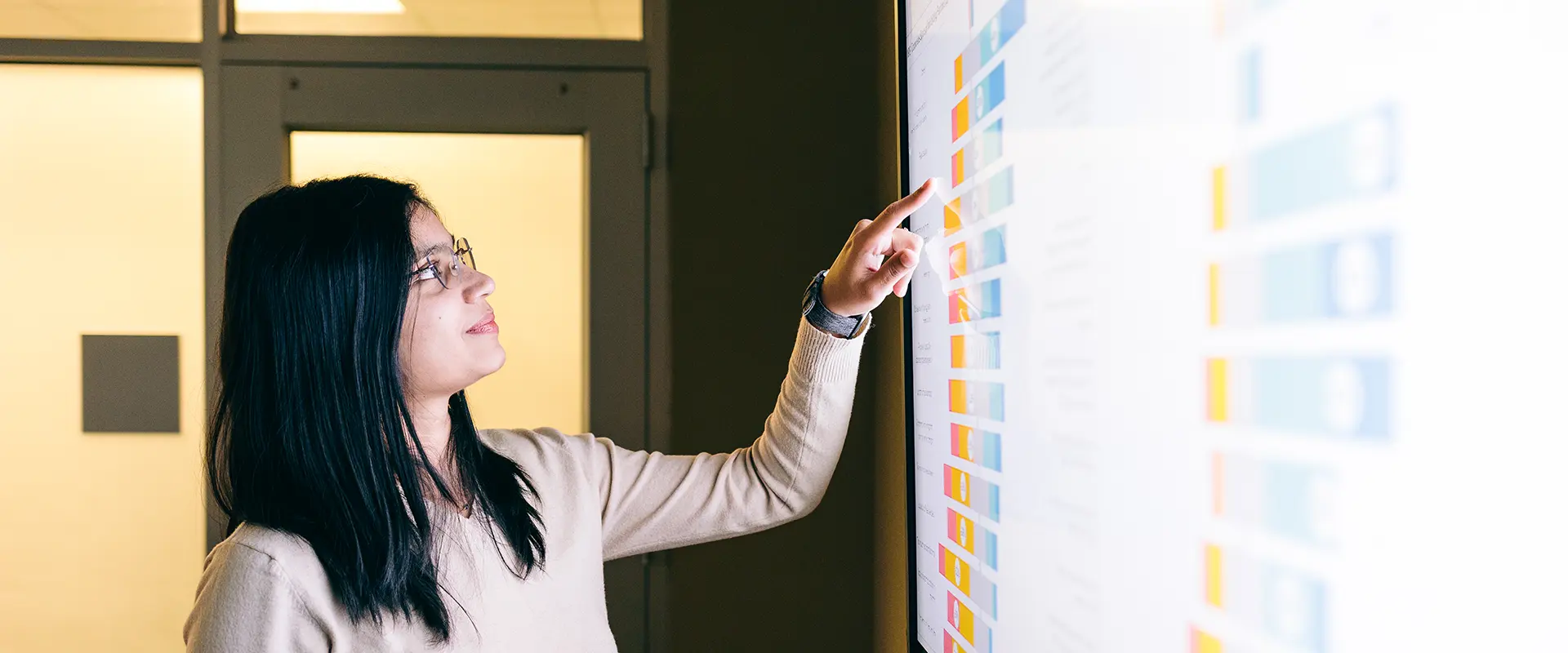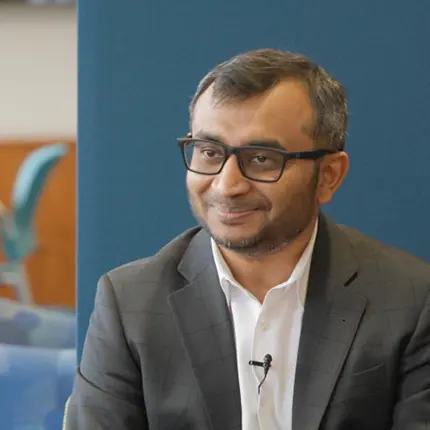
In today’s world, technology multiplies scale and increases the creation of value in almost all industries. The near universal digitalization of the economy has created a void in the market for graduate programs that train STEM undergraduates to manage tech implementations and take new technological innovations to market.
A new master’s degree program at Purdue’s Mitchell E. Daniels, Jr. School of Business will prepare the next generation of graduates ready to lead teams and organizations in the digital economy.
The Master of Business and Technology (MBT), a 12-month, 36-credit program on the West Lafayette campus, will leverage Purdue’s strengths in STEM with the Daniels School’s strong reputation at the intersection of business and technology. Students can choose from four elective concentrations in Robotics and Automation, Artificial Intelligence Innovations, Technology Commercialization, and Computational Finance.
The program also includes a capstone course that will apply students’ understanding of coursework in their unique employment context. The capstone will be particularly useful in commercializing technology, as students will be shown how to take their own products to market successfully.
“I’m excited about the potential of this new program to further our strengths in business and STEM,” says Patrick Wolfe, Purdue provost and executive vice president for academic affairs and diversity. “Our university is proud of its top 10 national ranking among the nation’s most innovative schools, and new programs like this will enhance that reputation by producing graduates who will mold and deliver companies and products we can’t even imagine today.”
“Realistically, every company today is a technology organization,” says Jim Bullard, Dr. Samuel R. Allen Dean of the Daniels School. “That means there is a critical need for business leaders to better understand how specific technologies can create a competitive advantage for their companies. They need training about how to prepare for the unfolding opportunities and make more informed business decisions.
“Many programs focus solely on business or technology. There’s a distinct gap in the market for graduate programs that cohesively integrate both. The Master of Business and Technology will create graduates who won’t just chase opportunities, but will create them, setting new standards for excellence in the nexus of business and technology.”
The program will appeal to students with undergraduate STEM degrees, particularly those who aspire to be entrepreneurs or to lead teams that build technology-driven business solutions. The first MBT class is scheduled to begin in fall 2024.
“Our core design principle for the program is technology-driven business solution ideation and execution,” says Mohammad Rahman, Daniels School Chair in Management and the inaugural academic director of the MBT program. “Graduates of the program will develop fluency in business fundamentals, strategic thinking of technology, technology product design and development, innovative business solutions, and leadership and communication."
“In addition to learning how to identify and monetize emerging opportunities in the business-technology interface, they also will discover how to critically evaluate the societal and economic implications of the business decisions they make and advocate for ethically sound business practices. The program’s curriculum is crafted for the digital age and will give graduates the most cutting-edge knowledge in a rapidly evolving business world.”
Core courses include offerings in Digital Product Design, Technology Governance and Regulations, Computational Business Intelligence and Economic Analysis of Technology Markets. Rahman says a course called Emerging Technologies and Business Models will help students learn how to analyze the economic and technological foundations of so-called “unicorns,” giving them insight into how to monetize what’s coming next to the market.
Rahman says that project-based learning will prepare graduates of the program to think critically and make decisions faced by leaders on a daily basis. Outside of coursework, the program will feature a technology landscape speaker series and will pair students with industry mentors, including alumni or professors of practice.
“It’s critical for today’s businesses to find people who can combine business acumen with technological knowledge. Companies need deep thinkers who can use technology-based solutions to solve existing problems and take new products to market. The MBT program will provide a rich pipeline to fill that talent need,” Rahman says.

He adds the MBT program is different from the traditional MBA. Typically two years in length, MBA programs tend to teach students ways to protect market share through cost leadership or product differentiation, where firms create a product, market it and sell it to customers. Value is made upstream and consumed downstream, similar to water in a pipe, and there is little to no opportunity for new technologies to create sustained advantage in the business model or act as a multiplier.
The one-year MBT program differs significantly, tailoring education to create and capture value from the digital transformation that is permeating through every company and every industry. Rahman points to a well-known cosmetics firm as a case in point.
“Take L'Oréal as an example. In the past, they would create a product and sell it to consumers through the pipe model,” he says. “Today, through digital interactions with their customers, the company can customize their products based on the tint of someone’s skin. They’ll create a different product for an outdoor midday event than an indoor evening affair.
“They’ve become more like a cutting-edge tech business than a traditional beauty company. If you want to have a competitive advantage in the marketplace, you need to have a deeper understanding of technology and a firm grasp of the business fundamentals. That’s what the Master of Business and Technology provides.”